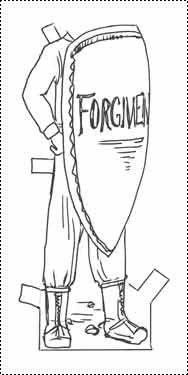I Love You, Mom
Rosie stepped back from the table and smiled. Everything was ready for Mom now. Her favorite cream puffs sat on a white plate. Irene had baked them when they were all outside yesterday, and Rosie had gotten up early to help her fill them with chocolate pudding. Emma and Kyle had each made a picture, and Daniel had picked a beautiful rose to go in the middle of the table. Chad’s gift was a wooden candle holder that he had carved in the shape of a heart. It stood next to a bowl of early strawberries that Daniel had found.
But it was the card beside Mom’s plate that was Rosie’s special gift. Under the colorful butterfly she had printed “I Love You, Mom!” in her best handwriting. Inside she had written: “I hope you have a good day. I will weed your flower garden for you. I love you lots and lots!” Irene had said that Mom would like weeding better than chocolate kisses. So at the bottom Rosie had drawn a row of bright flowers. She was sure Mom would be pleased when she opened it, and she was.
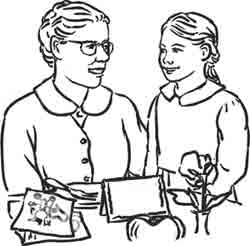
“I loved your sweet card,” Mom whispered as she gave her a squeeze. “Everything was so pretty. Thank you for making it so special.”
The children looked at each other and smiled. “Well, you are really special to us,” Irene said, as she got up to clear the table.
“As sweet as a rose,” Daniel said, handing her the vase. “Just smell it, Mom.” She did look lovely as she sniffed the bright red flower. She is the best Mom in the world! Rosie thought as she skipped out the door.
It was later that week when Mom mentioned the weeding. “The rain has stopped, so it will be a good day to work in the yard,” she said as she finished braiding Rosie’s hair. “The weeds will be easier to pull when the ground is soft.”
“How long do we have to work outside?” Rosie asked, slowly. She had wanted to make a new outfit for her paper dolls. Irene had promised to help her today.
“Well, if we all work together it shouldn’t take long,” Mom said, with a smile.
“But the boys have gone with Dad to town,” Rosie said. “And Irene has to stay inside because she has a cold.” Mom wasn’t listening. She had gone to help Kyle put on his jacket. Rosie didn’t feel very happy. She dragged her feet as she followed Mom out the door.
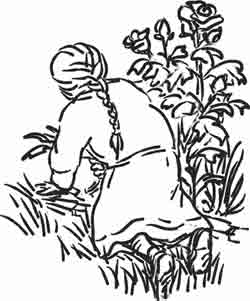
The weedy flowerbed didn’t make Rosie feel happier. It seemed like a whole forest had grown up since last week. I should have done the dishes instead, Rosie told herself. I’ll never be able to get all the weeds out today. Why did I tell Mom I’d weed her flowers?
But staring at them didn’t make the weeds go away and Mom was working in the strawberry patch with Emma and Kyle. Rosie stepped over to the rose bush and grabbed a handful of grass.
“Ouch!” she cried, as the grass pulled loose and her hand hit the cruel rose thorns. Rosie looked at the red scratch on her wrist and bit her lip. She wouldn’t cry, but she surely felt like it.
“Why don’t you put on some gloves?” Mom said, bringing over a pair. “Do you think a hoe will help?”
Rosie shook her head. She knew she should say “thank you,” but she couldn’t. Not now, anyway.
As she bent back to work, she heard little Emma start to sing, “I’ll Be a Sunbeam.” It was one of Rosie’s favorite songs, but she didn’t want to sing it this morning. The gloves were too big and got in her way. And there were so many weeds.
“I’ll just finish this part and then take a break,” Rosie told herself. That thought cheered her up. A few more tugs and the rose bushes were free of weeds. It did look nice. Rose stood up and admired her work.
Mom wasn’t around to notice, so Rosie slipped inside. “You’ve finished weeding already?” Irene asked, looking up from her book.
“Yes. I’ve taken a break for awhile,” Rosie said. “The roses were really prickly and I got a bad scratch. What are you doing?”
“Reading about Abraham Lincoln. I have to write a report about him.”
“So you can’t work on paper dolls?” Rosie said, sadly.
“No, not until this afternoon. Why don’t you set the table for Mom? She’d like that.”
Rosie looked at the kitchen table. It was covered with a pile of laundry. “But what about the clothes? And I don’t even know what we’re having for lunch.”
Irene laughed. “Are you trying to get out of work? Fold the clothes and then ask Mom about lunch.” She looked at Rosie and said thoughtfully, “What did you say on the card you made Mom?”
“I love you, Mom,” said Rosie slowly. The card was sitting on the windowsill right above the sink.
“Well, did you mean it?”
“Yes.”
“Then are you going to prove it?” Irene asked softly. Rosie knew what she meant. Dad had talked about loving people just yesterday. You have to do your love and not just say it, and that was the real proof if you loved someone.
Rosie hung her head. Why did it have to be so hard? She did love Mom. She just didn’t feel like working. “I wish I didn’t say I would weed for her,” Rosie said aloud.
“You mean, you wish that you didn’t say you loved her,” said Irene. “The problem is that you are really just loving yourself.”
“I do love Mom!” Rosie cried, and ran from the room. After she had laid on her bed for a while, Rosie brushed the tears from her eyes and thought about what she should do.
“Dear Heavenly Father,” she said at last, shutting her eyes. “I do love Mom and I am sorry for being grouchy. Help me to obey and be happy. Help me be good. In Jesus’ name, Amen.”
When she opened her eyes again, a sunbeam was shining through the window. It reminded her of the song Emma had been singing. How did the words go? In every way try to please Him. And Rosie knew what Jesus would want her to do.
It was almost lunchtime when Rosie came inside, smiling brightly. She slipped a vase from the cupboard and soon returned with a bright bouquet of fresh flowers.
“How beautiful!” Mother exclaimed when she saw it. “I didn’t know there were so many flowers blooming. Are they all from our yard?”
“Oh, yes,” Rosie said. “I didn’t take them all. I do want you to come out and see them!”
“You did a very good job,” Mom said, looking at the flower bed with a smile. “It was quite full of weeds. Thank you.”
“Thank you!” said Rosie, flinging her arms around Mom’s neck. “I’m sorry for complaining, for you are the best Mom in the world and I love you lots and lots!” And this time she knew that she meant it from her heart.
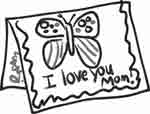
What Are You Saying?
Have you ever said, “I love you,” to your mom or dad? I’m sure you have. You probably have also said, “I want to be good. I want to do what is right.” Not many children want to be bad. So if someone talks about stealing, or lying, or cheating, you say, “I never do that! I always tell the truth.” But what are you really saying?
You don’t speak only with your tongue. The tone of your voice says something, and so does your attitude. “I will help!” in a cheerful voice means something much different than, “I will help,” muttered as you glare at the floor. But it is your actions that speak loudest of all. They show what you are really saying.
The lesson Rosie learned in the story is an important lesson in life. It is what we do that shows what sort of person we really are. Are you someone who can be trusted? Do you really want to do right? What are your actions saying? If you put yourself first and think about how to get out of work, you are saying, “I love myself.” If you do your chores cheerfully and work hard to do your best, your actions say, “I want to be trusted.”
The Bible talks about those who say they love God and those that do God’s will. I might hear you pray, “Help me to do right today.” And then if I hear you quarrel with your brother and complain about the work Mom gives you to do, what are you saying? So how do you think you can show that you love God? Not by saying things with your lips. Anyone can do that. Think instead about saying things with your hands and feet today. Will you give God your time and energy and please Him in every way you can?
The Porcupine’s Mistake
Have you ever seen a porcupine? I could show you one. It is lying by the side of the road near the river, because it was hit by a car. When I drove by, I decided I would come again and take another look. Do you want to come with me?
Will it shoot quills at us? you ask. No, the big creature is quite dead. See its dark face and black eyes? It doesn’t look mean at all. It is covered with long, waving, black and gold hair. The quills are those short white darts with black tips that are poking out everywhere. See how its long tail is covered with them? If we are careful, we can pull a few out to take home.
That spiky tail is the porcupine’s great defense that keeps it safe from its enemies. The neighbor’s dog came home with a quill-covered nose once. They were very sharp and hard to pull out. After that he stayed away from porcupines! But this time the porcupine’s armor wasn’t what it needed. Poor creature! It thought it was safe and didn’t have to worry, but this time it made a mistake. Rubber tires don’t care about porcupine quills!
I think there is a lesson we could learn from the porcupine’s mistake. Maybe you think you are smart and able to keep away from trouble, too. If you are good-tempered or know how to behave well, that is a good thing. But we can’t count on our natural abilities to keep us safe. You might be good all week, but then some trouble or temptation will come that is too big for you. Jesus is a Savior stronger than any problem and is able to keep us from all evil. We need His protection in life. If you are just trusting in your own “quills,” you will end up as roadkill, too.

“Joe and Allie want to join our club, but they don’t want to work,” Edward said, sitting down next to Grandpa. “It is our club rule that everyone helps out. Should I let them come anyway?”
Grandpa looked at Edward’s sober face and smiled. “Being a club president is a difficult thing, isn’t it? Maybe you’d like to hear a story about when David became king, and how he was established by
The Standard of Righteousness
(Reference: 2 Samuel 3-4.)
After Saul had died, David was at last made king in Hebron. But from the start there was competition and trouble. While the people of Judah were eager to have him king, those from the capital were not. David sent his sympathy for Saul’s death and tried to encourage peace. But Saul’s faithful general, Abner, set up Saul’s son as king of Israel instead. And so the long struggle between the house of David and the house of Saul continued for several more years.
Suddenly the tables turned. Abner agreed to make peace, but was murdered by David’s unforgiving general. “I am not responsible for this man’s blood,” the distressed King said, as he mourned for the brave warrior. It was peace that David wanted, not revenge. He wanted to establish the throne in righteousness. How could all this cruel bloodshed be stopped?
David didn’t have long to wonder, for new trouble quickly followed. Two brothers, Rechab and Baanah, had arrived in Hebron with an important message for the king. “See, we have brought you the head of Ishbosheth, the son of your enemy Saul, who tried to kill you,” they said proudly. “The Lord has given the king revenge over his enemies today!” They had murdered Saul’s son on his bed and sneaked away without anyone finding out.
As David looked at their eager faces, he thought of how God had always delivered him from trouble. This was certainly not the way of righteousness. “As the Lord lives,” he said sternly, “I killed the man that thought I would reward him for the death of Saul, and how much more will you have to pay for killing an innocent man in his own house?”
At David’s command the wicked reward-seekers were killed and hung up as an solemn example. This King meant business when he said he wouldn’t revenge his enemies. So the poor head of Ishbosheth was buried, and with it, the long enmity with Saul’s house.
Edward looked thoughtful as Grandpa finished the story. “So you mean,” he said slowly, “it is better not to let Joe and Allie get away with not working, because the rest won’t want to help either?”
“You have to hold up the standard, or else you won’t have any standard,” Grandpa said quietly. “If David allowed the murder of these enemies, he might as well have killed Saul in the cave. And you know, he knew that was the wrong thing.”
“Didn’t God say he shouldn’t kill Saul?” Edward asked.
“We shouldn’t kill anybody,” little brother, Sammy, chimed in.
“That’s true,” Grandpa said. “God had allowed Saul to be king, and David wasn’t supposed to get revenge. But in his time God’s people often had to fight their enemies. It was to show them that all sin had to be removed.”
“Is that why David killed those two men?” big sister, Alice, said.
“Yes, he was showing that he did not support the evil plotting that was going on. David was a mighty warrior, but he trusted in God to help him do what was right, and to rule rightly.”
“He was a good king, wasn’t he?” said Sammy.
“Of course!” said Edward. “He stood up for what was right and trusted in God. I’m going to do that, too.”
Once Jesus’ disciples asked Him, “What shall we do, that we might work the works of God?” Jesus replied, “This is the work of God, that ye believe on him whom he hath sent.” (John 6:28-29) God’s great purpose was to send His Son to deliver men from sin. But would men receive Him and believe on Him? Many did not.
To those who will listen, God is still asking the same question. It does not matter whether you are educated in a special school or have been raised in a jungle tribe. It doesn’t depend on your religion, or how good you have been—or how bad—nor if you are dark or light, rich or poor, boy or girl. The question still is
Will You Believe on Him?
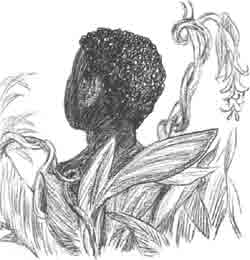
The dark-skinned boy was quiet as he walked the jungle trail. His mind was filled with strange new thoughts. All his life he had heard the stories of his people: the bravery of their warriors, the skill of their hunters, and the sad, sad story of how they had been deceived and lost God. No one talked about it much, but it was in times of trouble that they all felt it. When they called for Him, God did not come to help them. They were lost and without hope. But now the young boy had heard a strange new story.
What was it? That God had made Himself small, like an ant, and walked as a man on earth. His name was Jesus Christ, and He had come to show them God’s trail so that they could find Him again. That was wonderful news, but his tall friend wasn’t finished with the story. They had murdered Jesus Christ. Now they had surely lost their only chance to know God! But it was Christ’s blood that had been used to hide their sin, just as the hunters always used the animal skin to keep out the voices of evil spirits.
The boy looked up into the canopy of leaves and vines overhead. There were many spirits in the jungle. Spirits to be afraid of, and spirits to listen to. There were many trails in the jungle, too. Which was Jesus Christ’s trail? No one in his tribe had ever walked it before. Who could show him how to walk on it? He must ask his tall friend when they sat around the fire tonight.
“Remember the Feast of the Arrows, Bobby, and how I was afraid to climb into the hammocks to sing?” his friend said. “I wanted to keep one foot on the ground.”
Bobby nodded. “Yes, and I said you had to have both feet in. You had to hang in the hammock and let it hold you up,” he said, a grin spreading over his brown face.
“That is the way you must follow Jesus,” his friend continued, as the firelight danced on their faces. “No one else can show you His trail. Only Jesus can. You must hang your own hammock strings on Jesus and trust God to hold you up.”
In the darkness of the night Bobby thought about what his friend had said. He thought about it as he lay swinging gently in his hammock. How can I hang my hammock in Jesus Christ? he thought. I can’t see Him or feel Him. But I want to know the way to God and He’s the one that can show me.
The next day as Bobby walked the trails that he knew so well, he felt the warm steamy air and the soft soil beneath his feet. The jungle was alive with whirring insects and parrots calling to one anther, but Bobby was not listening to them. His mind and heart were calling for Jesus Christ. Bobby knew that He was there, though he couldn’t touch Him or hear Him. His friend had said that it was God’s Spirit that could show him the way.
Suddenly Bobby stopped. “Jesus Christ, I want to walk Your trail—not my own trails anymore,” he said, stretching out his arms. “I want to tie my hammock strings in You and learn Your language.” It was then that a great peace filled his heart and it seemed that Someone stood very close to him. Bobby’s dark face broke into a smile and he felt like shouting. Yes, he now had a new language to speak—a whole new life. Jesus Christ had come to walk the trail with him.
—The true story of Bobby, a Motilone of Columbia, can be found in Bruchko, by Bruce Olson
Fanny was blind. But that didn’t bother her much. She had learned to listen to the sounds around her to know where she was. She could tell people apart by their step and voice. Right now a young man was leading her to a seat in the church where a revival was being held. She smiled as she sat down and listened to the singing. But inside she was not smiling.
Why wasn’t she happy? Fanny was now a teacher at the blind school where she had come as a young girl. She wrote poems and a book of them had been published. Her songs were being sung around the country. She had come to great success, even though she could not see. Why didn’t she have peace inside?
Fanny had tried to seek God. Two times she had gone down to the altar after the meeting and prayed. She wanted to be right with God and have peace, but she couldn’t make it happen.
Ever since she was a little girl, there had been an empty spot inside. Fanny thought if she could study like other children, she could be happy. Maybe if she could be a poet and do something important the empty spot could be filled. But it wasn’t. All the trying and learning hadn’t helped.
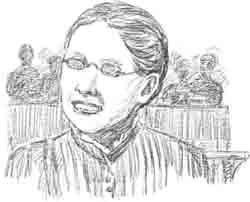
Now Fanny listened carefully as the preacher spoke about God’s grace and mercy. The penalty for sin was death, and Jesus had come to pay that price for us. She had heard that many times. But how did that help her?
As she went forward to pray one more time, she thought about the song everyone was singing: “At the cross, where I first saw the light and the burden of my heart rolled away!” Fanny wanted that. Her heart felt heavy all right. Suddenly she listened to the last verse.
“Here, Lord, I give myself away,
’Tis all that I can do.”*
To give herself? To just trust God to make her happy and believe that He could? Fanny, the teacher and song writer, liked to do things herself. She didn’t like others to help her. But that was what she must do. She must let go of her own ways and let Jesus lead her.
With a smile filling her heart, Fanny joined in the song: “It was there by faith I received my sight, And now I am happy all the day!”
—This true story is taken from Of Fanny Crosby and the Light, her biography by Sandy Dengler
The little girl in the sari dashed the tears from her eyes and tried to smile. She was leaving her big sister and the kind people at the mission. She was leaving because Father was angry and didn’t want her to stay. “One curse in the family is enough!” he had growled when she had begged to listen some more.
“Oh, but Father,” she had plead, “can’t I learn a little more and then come home? Please, Father!”
She clung to his hand, but he shouted, “Just look at your sister! One shame is enough, I say!” The dark eyes filled with tears and spilled over. But Father was not impressed. “We must go,” he said, and she was led off down the street. Would she ever get to come back? The dark head lifted and the little girl turned for one last look.

She had heard a little and it had been all so beautiful. Like the blue over her head and the bright flowers in the courtyard. As she walked by her father’s side, the little Hindu girl thought about the God that had made them all. And He loves me and will be my Father, she remembered, with a flood of happiness. How wonderful that He is everywhere and can do everything!
“Why, Mimosa! What is the matter with you?” said her mother the next morning, as the little girl turned away from the holy basket. Siva’s ashes were in it. Siva, the Hindu god whom they all honored. Mimosa shook her head. She could not smear the ashes on her forehead now.
They thought is was a silly idea that would soon leave her. But somehow she could not look at those white ashes as she had before. Siva was not her God. Mother grew angry and her sisters scolded.
“She has been bewitched by the white people!” said her aunt.
“No, she is spoiled,” cried her mother. “She must learn to obey.”
“Like the help of the rod, what help is there?” said her aunt. So Mimosa felt the sting of the stick and was punished for her naughtiness.
But the wonderful Love, whom she knew so little about, had charmed her. Her family scorned her and no one else cared, but the Love of God had won her heart. She could not forsake Him. Though she was beaten for it, yet He was her God and she would believe in Him.
—The true story of this Indian girl is told in the book Mimosa, by Amy Carmichael
To an uncivilized Columbian boy the question was settled on a jungle trail. For the blind poet, who had learned to conquer life alone, the call was answered when she yielded at a church altar. And the little Hindu girl gave her response when she refused to smear on Siva’s ashes. They believed on Him as their Savior and Lord, and were called the children of the living God.
Will You Believe on Him?
Something You Can Do
Do you ever have extra free time and wonder how to spend it? Maybe you want to do something fun with your brothers and sisters, but you are tired of playing games or working on projects. Maybe Mom wants you to do something helpful together. Why not start
A Caring Hands Club

You can name it what you like, but the first thing you would want to decide is your reason for having a club. Will you plan ways to get the work done around the house extra fast? Maybe you want to form a secret society that thinks of ways to surprise people by helping them without them knowing. Or your club can be for everyone who wants to practice doing unto others as you want them to do to you.
Next you will have to organize your club. One person should be chosen for president or club leader. He or she will be responsible for making the final decision and keeping everyone in order. Maybe you could vote on who would do that job the best. You don’t have to do a lot of organizing, but here are some jobs other people could have:
- a vice president would advise and help the president
- a secretary is in charge of writing the rules and plans of the club
- a janitor can keep the club meeting place clean
- an organizer could help plan the projects and keep track of supplies
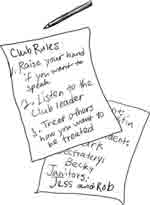
Before you think about all the things you want to do, remember to name your club and make some requirements for club members. Should everyone be allowed to talk at once? Can a club member get kicked out if they don’t behave? How often will you meet? Remember, your parents will need to know what you are up to! Get their permission before you make your plans.
The best club is the one is not thinking about themselves, but others. It doesn’t matter if you can’t do what you planned on. What is important is that you do the right thing. A good club will keep a standard of what is right, no matter if other people think you are silly or strange. What would God be pleased with? His opinion is what really counts in the end!
The Soldier’s Armor
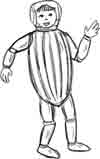

Did you know that a beetle has no bones inside his body, because the outside of his body is all bones? It is called an exoskeleton, which means, bones on the outside. His bones are made of chitlin, which is very hard, like your fingernail.
You and I don’t have exoskeletons, because our bones are on the inside of us. When we bump into things, we can get bruised, because our skin, muscles, and soft parts are on the outside of our bones, for the most part. Wouldn’t we look funny if we had an exoskeleton, like a beetle? If a beetle bumps into things, he doesn’t hurt and feel sore for a long time. His armor keeps him safe and protected.
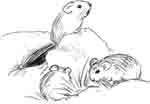

Some animals have learned to hide in caves to protect themselves. In Proverbs 30:26 we read: “The conies are but a feeble folk, yet make they their houses in the rocks.” Conies are like guinea pigs, and are very soft to touch and gentle. These little weak animals could be killed easily, but they hide in the caves in the rocks. Their enemies cannot get to them, for they are protected by the armor of the rocks.
In Ephesians 6:11, the Bible tells us about the armor of the Christian. “Put on the whole armour of God, that ye may be able to stand against the wiles of the devil.” We put on this armor on to protect our heart against the devil and hard things that happen to us in life. Things such as disappointments and sickness that could hurt us inside.
“The rock of my strength, and my refuge, is in God.” (Psalm 62:7) God’s children are weak and easily hurt, but they learn to hide in Him. God is strong, and we are strong in Him, just as a cony is strong because of the rock’s strength. Conies eat grass, but one always watches while the others eat. This watcher cony sits up on a rock and watches for danger all the time. If an enemy is spotted, it gives a sharp whistle. Then every smart cony dives into the rocks. In this way, they escape those who hunt them.
A little boy had an older brother who was always doing mean things to him. But this little boy put on the armor of forgiveness. He was ready to forgive his brother before his brother did something mean to him. This protected his heart, so he was not hurt by his older brother’s unloving ways.
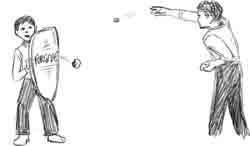
Letter to a Little Princess
Dear Princess,
Have you thought of how important your golden gown of obedience really is? Those who have worn it have been able to save their own lives and others, too. There once was a princess in a Persian palace who was very beautiful. It was not only her carefully combed hair and rosy cheeks that made her pretty. It was her golden gown of obedience that she had learned to wear since she was a small girl. All her maids loved her, for she never was selfish or vain.
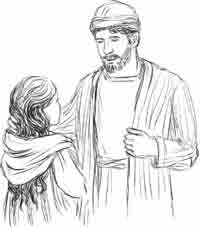
No one knew that she was once a little orphan from Judah, or that she had been adopted by her kind cousin that worked in the king’s gate. It was in his little house that she had first worn that golden gown, years before she had ever come to live in the palace. He told her that she must never tell that she was really a Judean girl. And of course she obeyed.
Now the king of Persia was looking for a beautiful princess to be his queen. When he saw the sweet Judean princess, he chose her at once. There was no queen of Persia so loving and kind as she was, everybody said.
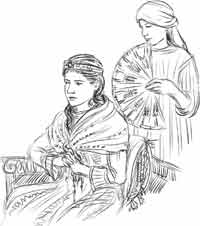
One day a maid brought troubling news to the queen. “One of Jews that works at the gate is wailing and throwing ashes on his head.” The queen sent a trusted servant to find out what was the matter, for she knew it must be her father.
The servant came back with the message: “The king has signed a decree to have all the Jews killed in the land of Persia. You must go before the King and plead for the lives of your people.” The young Queen was frightened. The King could get very angry sometimes, and no one was supposed to go into the throne room unless he invited them.
“Tell him that even the queen cannot visit the king unless she is invited. I have not been called to come see the king for thirty days,” she said. Didn’t he see that she couldn’t obey him this time?
But his answer came back firmly: “Don’t think that you will escape because you are in the palace,” her father replied. “If you don’t speak up, we will surely be destroyed. Maybe you have been made queen for this very reason.”
Would she do right and obey? It was a scary thought, but she sent the message back: “Gather all the Jews and pray for me three days. My maids and I will do the same. Then I will go before the king, even though it is against the law. If I perish, I perish.”
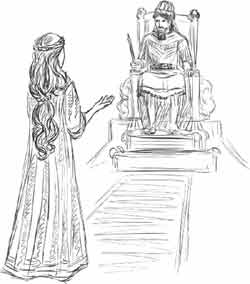
Brave little queen! Wearing her golden gown and her sweetest smile, she came trembling before the great Persian king. And don’t you know that he was pleased to see her and give her what she desired? It was obedience that saved her people that day.
Love,
Aunt Faith
 Jesus, Help Me
Jesus, Help Me
Dear Reader
We are thankful that the results of this effort do not count on us, but the God who has saved us and called us with a holy calling. Except the Lord work, our labor is in vain. But we trust that He is working, and seeking those who will worship Him in spirit and in truth. May the little thoughts presented here give you more of a glimpse of the King.
We would be glad to hear from any of you. We welcome questions, and would be very happy to learn how the Lord has been helping you.
We are a God-fearing family that includes Rick and Krista Erickson, Laura (23), Joel (22), Kara (19), and Amanda (11). The publishing of Treasures of the Kingdom is mainly done by Laura and Joel, with help (guidance, proofreading, and contributions) from others.
In the King’s Service,
The Editors
